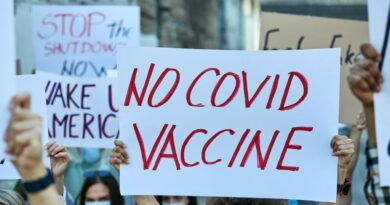‘Covid’ Fake Vaccines Increase Risk of Heart-Related Deaths by Up to 50%, Lancet Analysis of Trial Data Finds

A preprint study (not yet peer-reviewed) in the Lancet has analysed the mortality data from the vaccine trials and made the shocking finding that mRNA vaccines had “no effect on overall mortality”. Worse, it found the risk of non-Covid, non-accident mortality actually increased by 17% (relative risk 1.17, 95% confidence interval (CI) 0.67-2.05). Furthermore, a full 50% of the non-Covid deaths (27 out of 54) were cardiovascular and the relative risk of such death was 45% higher in the vaccine arm (relative risk 1.45, CI 0.67-3.13), breaking down to 50% higher for Pfizer and 40% higher for Moderna (with wide confidence intervals).
These are clearly alarming findings. But they go oddly unremarked upon in the paper. This is presumably due to the authors being wary of criticising the vaccines in order to be published. If so, it is disappointing that this is thought (probably correctly) to be necessary and indicates how absurdly political vaccine research has become. While the results are not, in this study, statistically significant, in that the confidence intervals are wide and include 1.0, the effect size is large and, in the context of wider concerns about adverse effects of mRNA vaccines on the cardiovascular system, warrant some comment, if only to flag them up and say larger studies are needed to see if statistical significance obtains.
The focus of the paper is instead on the surprising finding that the adenovirus-vector vaccines (e.g. AstraZeneca and J&J) appear significantly to reduce overall mortality. Most strikingly, there are zero cardiovascular deaths in the vaccine arm versus five in the placebo arm. The relative risk of non-accident, non-Covid death is 62% lower in the vaccine arm than the placebo arm (relative risk 0.38 CI 0.17-0.88). Overall mortality is 63% down.
The authors note it appears the adenovirus-vector vaccines “provide significant protection” against cardiovascular disease, speculating that the adenovirus-vector, though not able to replicate, “may prime the immune system in a way similar to a ‘live’ vaccine”. How this might protect against cardiovascular disease is not explained.
It’s not clear to me how seriously the authors take the finding that adenovirus-vector vaccines cut overall mortality by nearly two thirds, or whether making the case for it is an elaborate way of sneaking the devastating data on mRNA vaccines past the censors. I’m certainly suspicious of any trial data for a Covid vaccine that imply it is unexpectedly a miracle cure for cardiovascular disease, and I would expect they discreetly are too.
The main conclusion of the paper is that, given the remarkable general healing properties of one type of vaccine but not the other, the overall impact of vaccines on mortality should be studied much more closely.
New Zealand is a fascinating country – amazing geography, likeable population, and, unlike its neighbour Australia, most of its wildlife isn’t planning on killing you at the slightest opportunity. It is also fascinating with respect to Covid because its population has a very high vaccination rate across all age groups (well, down to five), but up until recently there has been negligible natural immunity to Covid. Because of these two factors, New Zealand was always going to be of interest as soon as Covid arrived properly, if only to see how its vaccination efforts had protected its population.
For those who missed it, since the end of last year New Zealand has had a succession of Covid waves. These started small, but in the most recent wave, taking place during February and March, infection rates were enormous – if we had these infection rates in the U.K. we’d have peaked at approximately 350,000 cases per day (rather than around 200,000). What’s more, it looks like New Zealand exceeded its testing capacity during that wave, suggesting that peak infections were probably even higher. It is relevant to note that during February and March, New Zealand had over 90% of all the cases it has ever had and most of the rest occurred in January – prior to 2022 New Zealand reported very few Covid infections.
So much for the Covid vaccines protecting against infection – but what do the data look like in detail?
Cases
New Zealand is somewhat helpful in that it does publish daily cases, hospitalisations and deaths by vaccine status; somewhat because it doesn’t allow easy access to anything other than the current day’s report. Thankfully, the Wayback Machine ensures that at least some web pages aren’t forever lost to history. These data were collated for dates since mid February 2022 and smoothed with a seven-day moving average to create a time series of Covid cases by vaccine status.




